Natural Remedies For Lung Cancer In Dogs
Lung Supplements For Dogs
Why Use Natural Remedies For Dog Lung Cancer?
Ask Ariel's lung supplements for dogs can be used along with conventional treatments prescribed by your veterinarian. Our natural remedies can help your dog in three different ways:
- Helps relieve pain and inflammation.
- Supports immunity to help your pup fight cancer.
- Reduces coughing, helps pets breathe easier and gives them more energy.
.png) Happy Paws Organic Hemp Extract For Dogs is a professional veterinary strength CBD oil that can help reduce inflammation and support a healthy immune system. Controlling inflammation is a core part of cancer treatment, and that is the main characteristic of this dog lung cancer oil. The ingredients in Happy Paws are being researched for their ability to reduce metastasis and cancer growth in certain types of cancer. Anecdotal reports include reduced pain, inflammation and discomfort. Each 1oz bottle contains 550mg of full-spectrum hemp extract in an unflavored all-natural coconut-oil base. It’s 100% organic and made in the USA. Happy Paws Organic Hemp Extract For Dogs is a professional veterinary strength CBD oil that can help reduce inflammation and support a healthy immune system. Controlling inflammation is a core part of cancer treatment, and that is the main characteristic of this dog lung cancer oil. The ingredients in Happy Paws are being researched for their ability to reduce metastasis and cancer growth in certain types of cancer. Anecdotal reports include reduced pain, inflammation and discomfort. Each 1oz bottle contains 550mg of full-spectrum hemp extract in an unflavored all-natural coconut-oil base. It’s 100% organic and made in the USA.
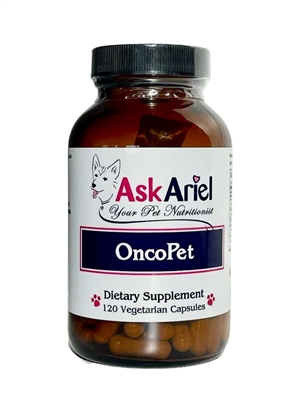 OncoPet Cancer Vitamin For Dogs is a proprietary blend of herbs and medicinal mushrooms that provide powerful immune support. The natural ingredients in OncoPet contain polyphenols, beta-glucans and antioxidants, like D-fraction and L-ergothioneine, that boost the immune system and help regulate your dog's inflammatory response. OncoPet is a comprehensive dog cancer vitamin that also includes herbs to help balance the gut microbiome and reduce nausea and cancer-related fatigue. Combines well with cancer treatments from your veterinarian or veterinary oncologist. Helps pets handle chemotherapy and radiation. Excellent value. One bottle lasts up to 8 months for small dogs. OncoPet Cancer Vitamin For Dogs is a proprietary blend of herbs and medicinal mushrooms that provide powerful immune support. The natural ingredients in OncoPet contain polyphenols, beta-glucans and antioxidants, like D-fraction and L-ergothioneine, that boost the immune system and help regulate your dog's inflammatory response. OncoPet is a comprehensive dog cancer vitamin that also includes herbs to help balance the gut microbiome and reduce nausea and cancer-related fatigue. Combines well with cancer treatments from your veterinarian or veterinary oncologist. Helps pets handle chemotherapy and radiation. Excellent value. One bottle lasts up to 8 months for small dogs.
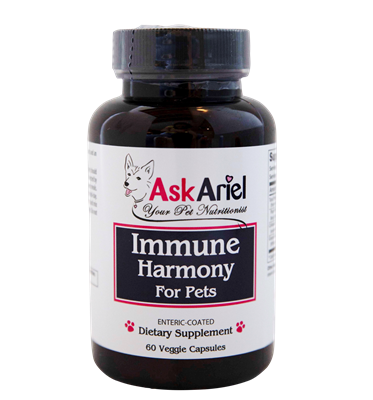 Immune Harmony is a premium-quality, patented blend of plant sterols and antioxidants. It’s the number one choice for pets with cancer. It’s a unique patented plant sterol supplement and is tolerated well by even the smallest pets. This pet vitamin has been successfully used in conjunction with chemotherapy and/or prednisone since 2005. The sterols contained in Immune Harmony have been shown in studies to have anti-inflammatory, anticancer and immunomodulatory properties. No known toxicity has been found. The antioxidants protect the body from free-radical damage, and an essential fatty acid complex assists in the bioavailability of these health-promoting nutrients. It’s an excellent value: One bottle lasts between two and four months depending upon the weight of your pet. When looking for supplements for canine lung cancer, Immune Harmony is the first line of defense. Immune Harmony is a premium-quality, patented blend of plant sterols and antioxidants. It’s the number one choice for pets with cancer. It’s a unique patented plant sterol supplement and is tolerated well by even the smallest pets. This pet vitamin has been successfully used in conjunction with chemotherapy and/or prednisone since 2005. The sterols contained in Immune Harmony have been shown in studies to have anti-inflammatory, anticancer and immunomodulatory properties. No known toxicity has been found. The antioxidants protect the body from free-radical damage, and an essential fatty acid complex assists in the bioavailability of these health-promoting nutrients. It’s an excellent value: One bottle lasts between two and four months depending upon the weight of your pet. When looking for supplements for canine lung cancer, Immune Harmony is the first line of defense.
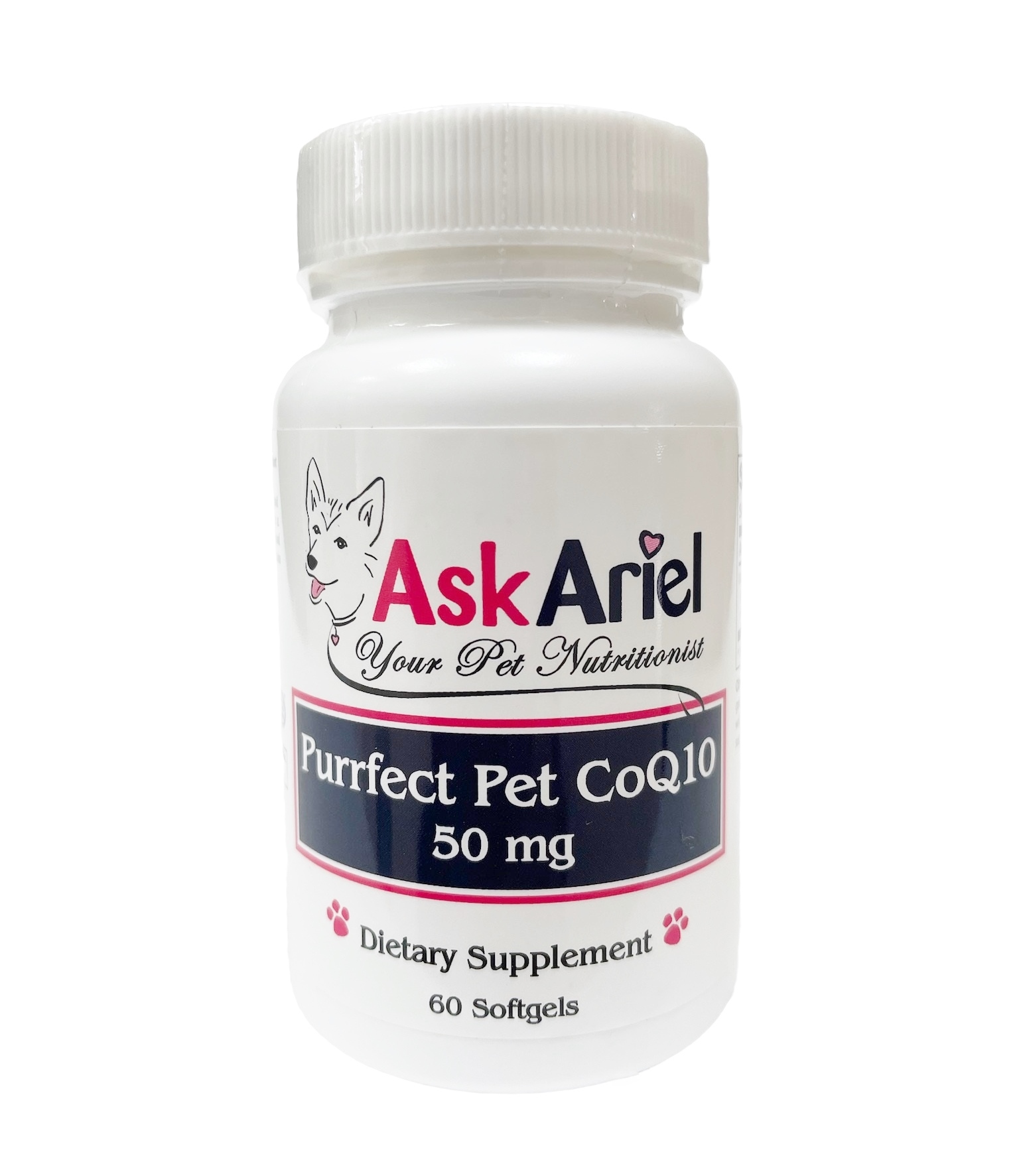 Purrfect Pet CoQ10 helps support your dog's circulation, cardiovascular and heart health on a cellular level. Coenzyme Q10 is a powerful antioxidant found in all cells that helps to facilitate enzyme activity and energy production and helps to maintain healthy heart function and respiration. Purrfect Pet CoQ10 can increase tissue oxygenation and help to ease lung inflammation. Purrfect Pet is made with genuine Kaneka Ubiquinol™, the reduced, active antioxidant form of coenzyme Q10. Ubiquinol is up to 8 times more absorbable than conventional coenzyme Q10 making the efficacy superior to other products with standard CoQ10 - backed by over 18 clinical studies. Experts recommend CoQ10 for lung health supplementation. Purrfect Pet CoQ10 helps support your dog's circulation, cardiovascular and heart health on a cellular level. Coenzyme Q10 is a powerful antioxidant found in all cells that helps to facilitate enzyme activity and energy production and helps to maintain healthy heart function and respiration. Purrfect Pet CoQ10 can increase tissue oxygenation and help to ease lung inflammation. Purrfect Pet is made with genuine Kaneka Ubiquinol™, the reduced, active antioxidant form of coenzyme Q10. Ubiquinol is up to 8 times more absorbable than conventional coenzyme Q10 making the efficacy superior to other products with standard CoQ10 - backed by over 18 clinical studies. Experts recommend CoQ10 for lung health supplementation.
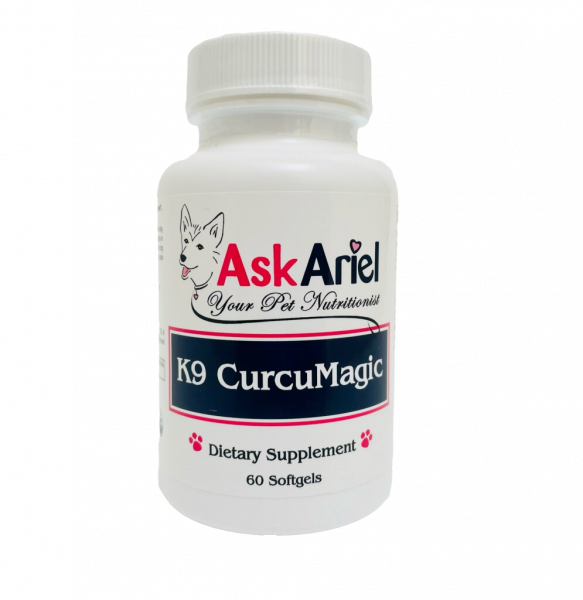 K9 CurcuMagic is a scientifically proven, natural anti-inflammatory pet supplement containing a patented combination of three curcuminoids acting as free-radical scavengers. These cancer-fighting nutrients in this unique bioactive turmeric formula help pets prevent and fight cancer. K9 CurcuMagic absorbs best when digested with fat, especially omega-3 fatty acids (found in Amazing Omegas), which is why our clients use the two pet cancer supplements together. If your pet is undergoing radiation, curcumin can protect the skin. K9 CurcuMagic is a scientifically proven, natural anti-inflammatory pet supplement containing a patented combination of three curcuminoids acting as free-radical scavengers. These cancer-fighting nutrients in this unique bioactive turmeric formula help pets prevent and fight cancer. K9 CurcuMagic absorbs best when digested with fat, especially omega-3 fatty acids (found in Amazing Omegas), which is why our clients use the two pet cancer supplements together. If your pet is undergoing radiation, curcumin can protect the skin.
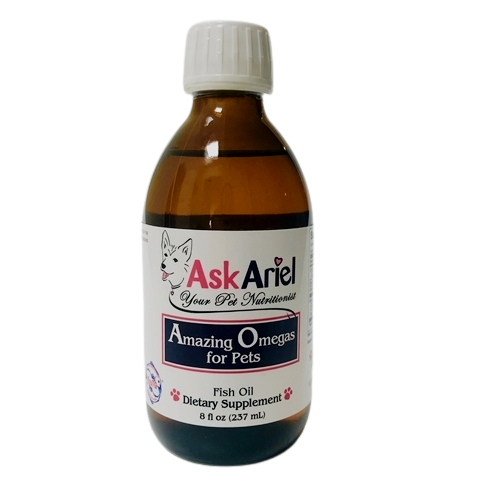 Amazing Omegas for Pets is the highest-quality purified fish oil available for pets. It is a powerhouse of omega-3 nutrients (essential fatty acids) that can help your dog fight cancer. Amazing Omegas is a highly purified fish oil made from sardines, anchovies and mackerel, processed with minimal heat to preserve the oil in its natural state. It’s packed in glass bottles to prevent any chemicals from plastic leaching into the oil. It’s naturally processed and highly bioavailable, and all toxins and heavy metals have been carefully removed. Compare the nutrient panel of this premium pet fish oil to all other brands and see the difference. Amazing Omegas for Pets is the highest-quality purified fish oil available for pets. It is a powerhouse of omega-3 nutrients (essential fatty acids) that can help your dog fight cancer. Amazing Omegas is a highly purified fish oil made from sardines, anchovies and mackerel, processed with minimal heat to preserve the oil in its natural state. It’s packed in glass bottles to prevent any chemicals from plastic leaching into the oil. It’s naturally processed and highly bioavailable, and all toxins and heavy metals have been carefully removed. Compare the nutrient panel of this premium pet fish oil to all other brands and see the difference.
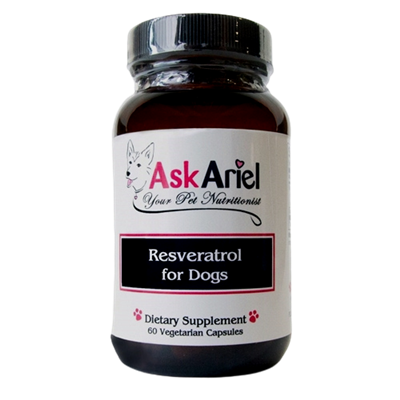 Resveratrol for Dogs is an exceptional antioxidant, backed by research, and can help your dog in so many ways. Cancer support and prevention (use with dog breeds that have a higher incidence of cancer, such as bichon frises, German shepherds, Labradors, golden retrievers and boxers). Resveratrol for Dogs acts on the process of carcinogenesis by affecting all three phases — tumor initiation, promotion and progression — and suppresses the final steps of carcinogenesis. Resveratrol for Dogs also supports immune function. Considering just these benefits, you can already see how Resveratrol provides excellent natural lung cancer support for dogs and cats. Resveratrol for Dogs is an exceptional antioxidant, backed by research, and can help your dog in so many ways. Cancer support and prevention (use with dog breeds that have a higher incidence of cancer, such as bichon frises, German shepherds, Labradors, golden retrievers and boxers). Resveratrol for Dogs acts on the process of carcinogenesis by affecting all three phases — tumor initiation, promotion and progression — and suppresses the final steps of carcinogenesis. Resveratrol for Dogs also supports immune function. Considering just these benefits, you can already see how Resveratrol provides excellent natural lung cancer support for dogs and cats.
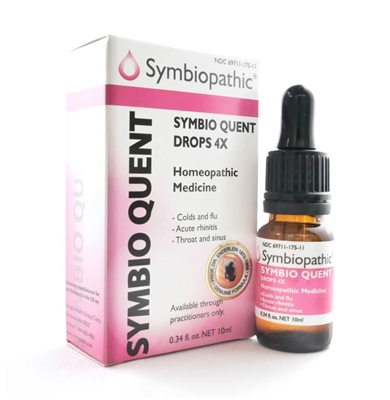 QUENT Drops is a lung supplement for dogs that fights viruses and infection, especially targeting the lung and upper respiratory system. Tumors in the lungs can make pets more susceptible to infection. Using QUENT Drops can support immunity in lung cancer patients, reducing respiratory symptoms such as coughing and wheezing. QUENT Drops are a tasteless, homeopathic remedy that is easy to administer, especially if your dog is not eating well. QUENT Drops is a lung supplement for dogs that fights viruses and infection, especially targeting the lung and upper respiratory system. Tumors in the lungs can make pets more susceptible to infection. Using QUENT Drops can support immunity in lung cancer patients, reducing respiratory symptoms such as coughing and wheezing. QUENT Drops are a tasteless, homeopathic remedy that is easy to administer, especially if your dog is not eating well.
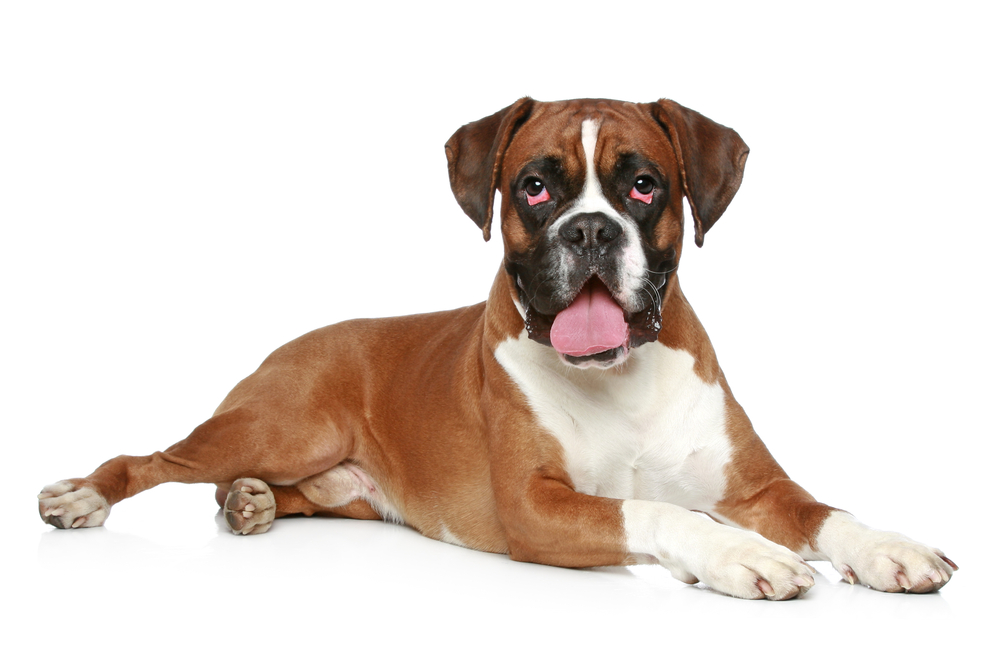
What Is Lung Cancer In Dogs?
Every cell in the body needs oxygen. The lungs are your dog's air filtering system. They send oxygen to cells through the bloodstream and exchange it for waste gas (carbon dioxide). The lungs exhale the waste gases to remove them from your pup's body. When the lungs aren't functioning properly, enough oxygen may not be reaching the heart and brain. If your dog is having breathing problems, it could be related to excess weight, allergies, chronic bronchitis, heart disease or lung cancer.
Lung tumors in dogs can develop from an irregular production of epithelial (skin) cells within the lungs. Adenocarcinoma is the most common type of lung cancer in dogs (accounting for 75% of cases). It can be a fast-growing malignant type of cancer, which can quickly spread to other parts of the body (including lymph nodes and the brain). It is usually found in older dogs (average age about 10), and some breeds may be more predisposed than others (boxers have a higher risk rate). The cause is unknown at this time, but one thought is long-term exposure to toxins (second-hand smoke, toxic cleaning agents, etc.) could raise the risk.
What Are The Types Of Lung Cancer In Dogs?
There are two types of lung cancer diagnosed in dogs. The first is primary lung cancer in which the tumors originate in the lung tissue. Dog lung tumors are quite rare, accounting for only 1% of all canine cancers diagnosed. The second type of dog lung cancer is metastatic lung cancer which is cancer that has spread from other locations via the blood or lymph system. This type of lung cancer is much more common in pets. Most lung cancer is diagnosed in older pets, generally between the ages of 10-12 years.
Most primary lung tumors in dogs are a type of cancer called carcinoma. Adenocarcinoma accounts for about 75% of all primary lung tumors in dogs. Adenocarcinomas can grow quickly and metastasize (spread) to organs, bones, and lymph nodes. Certain dog breeds appear to be predisposed to pulmonary carcinomas: Boxers, Doberman Pinschers, Australian Shepherds, Bernese Mountain Dogs and Irish Setters.
Pets with metastatic lung disease generally show symptoms similar to primary lung tumors, except that coughing is less common. Metastatic lung tumors have been brought to the lungs from a cancerous tumor somewhere else in the body; spread from osteosarcoma and lymphoma is common in dogs. Unfortunately, metastasis to the lungs generally occurs late in the clinical course of cancer and as many as 45% of dogs have tumors that are too small to be seen on x-rays. While primary lung tumors are usually a single mass, metastatic tumors tend to appear in masses.
Marco
"My dog Marco was diagnosed with inoperable lung cancer. I used a number of immune support supplements from Ask Ariel such as Resveratrol for Dogs, Curcumin For Pets, Amazing Omegas, Immune Harmony, Power Probiotic and a few others. One of his symptoms prior to using the supplements was his constant coughing. We previously had tried some coughing medication from the veterinarian and Marco was still coughing. But after using the supplements, his coughing improved so much. Thank you so much for helping Marco feel better!" - Karen, California
Symptoms Of Lung Cancer In Dogs
Some of the most common clinical symptoms of lung cancer are listed below. With many types of cancer, a pet will not show any outward signs that they are not feeling well. Subtle changes to appetite, mood and activity may signal that your dog does not feel well. Symptoms of lung cancer may include:
- Coughing
- Dyspnea (difficulty breathing)
- Tachypnea (rapid breathing)
- Exercise intolerance, low energy level and lethargy
- Poor appetite and gradual weight loss
Some dogs with lung tumors may cough up blood (hemoptysis), have fever or pain, start to exhibit muscle wasting or have an accumulation of fluid in the abdomen (ascites). Using natural vitamins for lung cancer in dogs can help to make your pet more comfortable by supporting lung function and reducing inflammation.
How Is Dog Lung Cancer Diagnosed?
Since many dogs with lung cancer have no symptoms, tumors are often found when a dog is undergoing routine diagnostic testing, such as blood work, urinalysis, or x-rays, for an unrelated condition. Testing for lung cancer may include:
- Chest x-ray
- Blood work & urinalysis
- Ultrasound or CT scan
- Biopsy
Complete diagnostic testing can help your vet or veterinary oncologist have a clearer picture of how much lung tissue has been affected by the cancer and can help to determine what treatment options may be helpful for your dog.
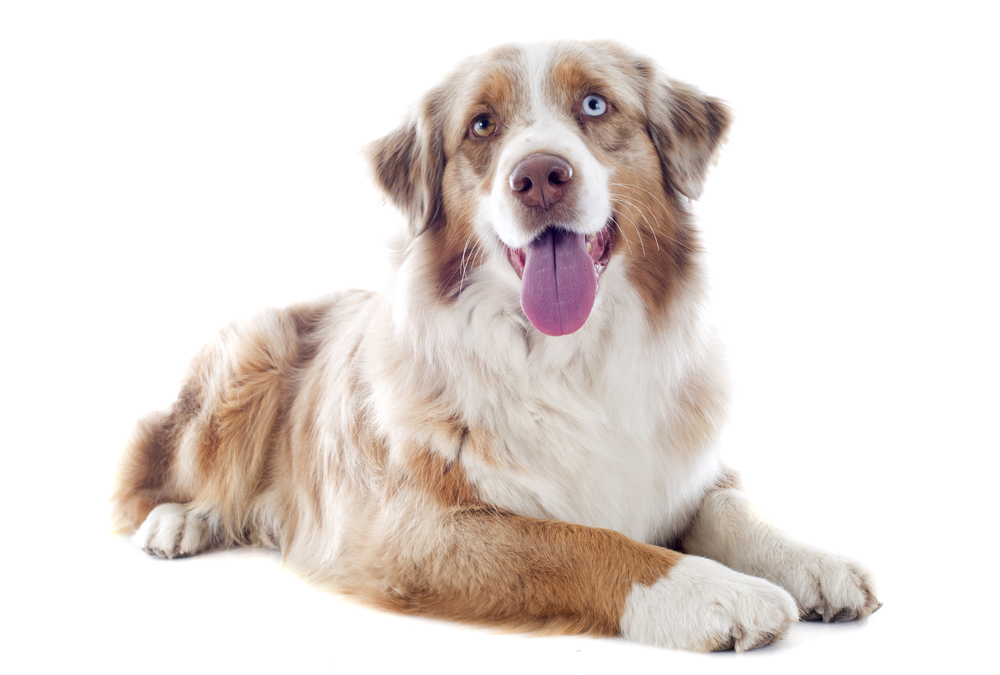
Treatment Options For Dog Lung Tumors
Surgery to remove the lung tumor and surrounding lung tissue or lung lobe is the recommended conventional veterinary treatment in most cases. If the tumors have spread to multiple lung lobes or the lymph nodes, chemotherapy is generally suggested as an alternative to surgery. Radiation therapy may also be used.
Holistic treatments for dog lung cancer can be combined with most conventional veterinary options. Adding natural immune support supplements, such as medicinal mushrooms, curcumin, CoQ10 and fish oil, can help your dog to breathe better and feel more comfortable. Simple diet changes can help to improve digestion and fight inflammation. At Ask Ariel, we will include FREE dog lung cancer diet tips on the packing slip that comes with your order.
How Long Can A Dog Live With Lung Cancer
The life expectancy of a dog with lung cancer varies depending on the type of cancer and the treatments selected. A dog that has a primary lung tumor (or tumors) removed can live an average of 12-16 months if the cancer has not spread to the lymph nodes. If the cancer has spread through the lymphatic system, the prognosis decreases to an average life expectancy of 2 months. Whether your dog has surgery or not, supportive care using a dog lung cancer diet and holistic cancer supplements for dogs can improve the quality of life for your pet and, often, the quantity of time as well.
Legend
"Our 13 year old dog Legend has lung scarring which can cause him to breathe and pant very heavily, especially after exercise. We saw a noticeable improvement in his breathing and stamina when we started using Purrfect Pet CoQ10 twice a day. The product seems to help him stay energized and to avoid gasping. It even helped to reduce his snoring!" - Davis Family, California
Lifestyle Changes Can Help Dogs With Lung Cancer
A comprehensive approach to treating lung cancer will provide the most relief for your dog. Check with your veterinarian or oncologist about combining natural supplements with any medications and treatments (radiation or chemotherapy) prescribed by them. Using holistic vitamins in combination with diet changes can help strengthen your dog's immune system. A few lifestyle changes can also help to lessen the severity of some lung cancer symptoms:
- Maintain a healthy weight. When your pet becomes overweight, it takes more energy to breathe. This pressure in the lungs can aggravate the inflamed tissue and cause coughing and difficulty breathing. Substituting green vegetables for some of the food in your dog's meals is an excellent way to help your dog lose weight. They help your pet feel more satisfied and offer a low-calorie, nutritious source of bulk food. Long, slow walks are very helpful for pets with lung cancer. They help to keep your dog active and may help to prevent lethargy and muscle wasting.
- Avoid airborne irritants. Cigarette smoke, dust, and strong fragrances can promote coughing. As with people, second-hand exposure to cigarette smoke has also been linked to the development of lung tumors in dogs. Dogs living inside homes with smokers have a 60% risk for developing lung cancer. Another possible risk factor is living in environments high in pollutants. Brachycephalic breeds with their flat noses are also at greater risk, due to less filtering in their nasal passages. By keeping the windows closed and by running an air conditioner or air purifier, you can minimize respiratory distress.
The Best Diet for Dogs With Lung Cancer
Lung cancer in dogs holistic treatment includes not only supplements, but diet changes as well. Dogs with lung cancer can benefit from a low-carbohydrate, hypoallergenic diet, rich in Omega-3 fatty acids. Research studies have shown that eicosapentaenoic acid (EPA) and docosahexaenoic acid (DHA), two types of omega-3 fatty acids, can help slow the development of tumors and metastases of certain cancers. By using a high-quality fish oil and adding a small portion of baked fish or sardines in water can provide a source of omega-3s in your dog's diet. Diets high in carbohydrates may promote tumor growth and should be controlled. Dry food diets generally are high in carbohydrates so choosing another form of dog food such as raw frozen, canned or homemade can be beneficial. Adding an array of fresh vegetables can provide important enzymes and nutrients to your dog's diet. Since the majority of your dog's immune system resides in the intestinal tract, maintaining a balanced microbiome is also essential. Probiotics along with fresh foods containing prebiotic fibers can support a healthy immune system. Ask Ariel has extensive experience formulating diets for pets with cancer as our Pet Nutritionist Susan Davis offered holistic consultations for over 10 years at VCA hospitals and at a veterinary oncology clinic. While we no longer offer consultations, we do include FREE dog lung cancer diet tips on the packing slip that comes with your order.
Need Help?
If you have questions about our vitamins for lung cancer in dogs, please feel free to email us at [email protected]. We will be happy to provide you with additional information about our natural remedies for lung cancer, but please know that due to veterinary regulations, we cannot provide individualized consultative advice without a physical exam.
|
|
|
What are the symptoms of lung cancer in dogs?
Many dogs with lung tumors will not show any obvious signs that they aren't feeling well. Coughing, difficulty breathing and rapid breathing are the most common clinical signs of lung cancer in dogs. Other symptoms may include lethargy, exercise intolerance, poor appetite and weight loss. Some dogs with lung cancer may cough up blood, have a fever or show muscle wasting.
What are treatments for lung cancer in dogs?
Holistic treatments can be combined with conventional veterinary care. The most common treatment for primary lung tumors is the surgical removal of the affected tissue. Chemotherapy and radiation are also used to treat dog lung cancer. Natural supplements and diet changes can help support your dog's immune system whether or not you elect to do surgery.
What are home remedies for dogs with cancer?
Natural remedies for cancer in dogs can be used in conjunction with conventional cancer treatments prescribed by your veterinarian or veterinary oncologist. Some immune support cancer vitamins, such as medicinal mushrooms, curcumin, fish oil, and antioxidants like resveratrol, can help dogs feel more comfortable while fighting cancer.
|
|
|